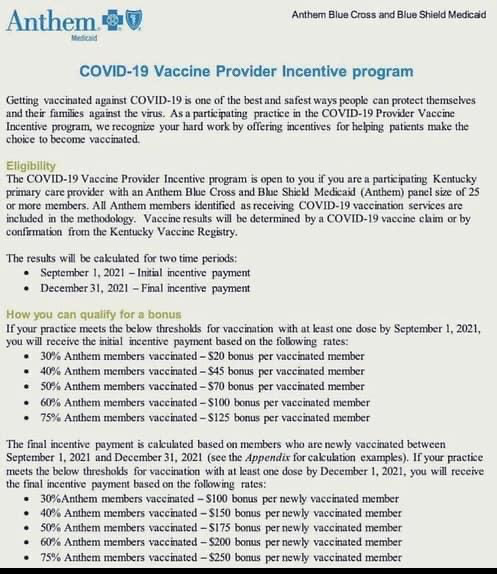Before the pandemic, I sporadically dedicated some of my scarce free time to researching ways to fix the health care system. I had these experiences and insights (linking prior posts, content continues below)
Hidden options in health care - Part 1
https://thecriticalmiddle.substack.com/p/hidden-options-in-health-care-part
Hidden options in health care - Part 2
Hidden options in health care - Part 3
Hidden options in health care - Part 4
and decided to explore a potential career shift, from financial services to health care. It wasn’t so far afield, functional experts like finance and marketing people change industries fairly often. As a product person, it might be a more challenging move, but it wasn’t out of the question. I dreamed of founding a startup that would upend the systemic faults that I had witnessed.
Believe it or not, Facebook groups are an incredible resource for people to share information on what worked for them (I held them in higher esteem before FB censored my share of a slide summarizing covid study outcomes). There are FB groups for just about every condition or disease, as well as natural healing groups, moral support groups and on and on. My hope was that technology companies like FB and Google could ally with health care, in a way that benefited consumers and boxed out pharma. (I know, incredibly naive. As I said elsewhere, I am an idealist at heart).
I did some networking and had a dozen or two conversations before the pandemic hit. Talking with people in the health industry, I learned that insurance companies do not care much about the costs of health care, and employers only sometimes do, on a short-term basis. As you probably already know - and I by that time understood - medical associations have ties to pharmaceutical companies in terms of how doctors are trained, what research gets funded, which protocols are allowed, and financial incentives from drug companies eg
To my disappointment, I learned that companies like Google were stepping into the health care space - not to disrupt or fix it, rather in partnership with the established players.
With low cost, more effective approaches (like supplements, acupuncture, diet modifications etc) available outside the mainstream health care system, I thought about creating some form of alternate insurance that would address the infuriating problem of having to pay out of pocket to get better using non-traditional methods, which made true healing out of reach for most people, due to its expense. Would employers fund a secondary, alternate insurance? Maybe, some.. if enough proof of savings and better outcomes was demonstrated, but it did not look to be a clear or efficient path. How long would it take to get employers on board, and how many would actually participate? How would this new insurance work? Another idea was to use technology to harness data about what works (eg from FB groups) and sell it to insurance companies, employers, medical companies - whoever would benefit from lower health care costs and better outcomes. But then again, did medical companies not know this information already? Would they really be open to supporting non-pharma options, given all the interconnections between doctors and pharma?
Enter my most recent idea: peer to peer health mentors. No middleman, or involvement from the health care system at all. Thinking like this,
https://www.fastcompany.com/42075/positive-deviant
we can start with people who have overcome chronic diseases and achieved true health. A Peace Corps of healthy people, if you will. We would need to recruit and vet truly healthy people - everyone knows one or two - and get them on the platform, possibly as volunteers. (My hand is up for IBS and CIU.) We could charge a small monthly subscription fee for members to access health mentors, who would share what worked for them and potentially provide more in-depth coaching on the specific path and actions that worked for them, eg to get off diabetes or cholesterol meds (for a fee to compensate for their time, which they could accept or donate). The member subscription fee would cover the costs of sourcing and vetting mentors, marketing the platform to attract members, technology and admin costs. Certain assurances and protections would need to be in place:
-health mentors could not be health providers, traditional or alternative - all would have to be regular people diagnosed with a condition and having overcome it
-health mentors would need to apply and be approved
-health mentors would be prohibited from receiving compensation for anyone or anything that they recommend
-none of the information shared would be legally categorized as medical advice, so it would not compete with or impinge on the medical system - just information shared between people
-there would be no advertising or any form of payment to alternative health providers, doctors, drugs, treatments, supplememts or other - creating an unbiased, advertising and referral fee free space
Perhaps some employers would subsidize the member subscription fee, as they do gym memberships - especially companies seeking to create an edge in attracting employees. It would be far less expensive and involved than covering an alternate health insurance plan.
It would likely need to be a non-profit. From a traditional corporate perspective, the potential appeal is limited: how many people would want to be a health mentor for a corporation? How would it scale, given the approach is founded in human interactions? Where are the outsized financial returns? But if it were a non-profit, truly motivated by and powered by the greater good, can you see people enrolling as a public service, and person by person, counterbalancing the effects of the toxic existing system? At least for those of us who understand that true health does not come from treating symptoms and instilling recurring prescription revenues.
Isn’t this the type of thing that government should, in a less biased world, support? Ideas that benefit society as a whole but do not create enough financial incentive to be financed for profit? I know, ever the idealist. But we have to start with believing better is possible, as Eisenstein recently reminded us
Stay tuned for more Tech for Good posts - sharing ideas that can benefit society, but do not have the profit potential to get funded. What do you think? I eagerly await your comments.






I love that you both are dreaming new systems of wellcare into being by grounding them in practicality!
Keeping oneself healthy is definitely a DIY, out-of-pocket situation that can be confusing as well as wreck the budget. I only use allopathic medical practitioners for a physical trauma or life-threatening situation. Otherwise, it's off to my roundtable of holistic practitioners and a quick survey of my holistic-minded friends, one of whom is bound to guide me to my next step.
Health mentors would be such an amazing support for someone overwhelmed with a new diagnosis. I think it's wonderful to have a mentor who's traveled a similar path who can guide you specifically regarding your condition. I would also add that health mentors who are generalists would also add value.
As an intuitive spiritual counselor, I often pick up on important signals that lead me to educate a client about the systems that underpin so-called alternative treatments because they're related to energy. I may not be able to guide them specifically regarding their exact diagnosis, but I can usually educate them about how to think about wellness and dis-ease, and suggestions for how to find their own roundtable (some of whom must be local v. remote) to support their wellness going forward.
This is uplifting! I look forward to diving into more of your work when time allows. Katie
So interesting that the incentive bonus for the last quarter either doubled or quintupled from earlier.
I love your idea of health mentors! I can think of so many applications off the top of my head, or the need for them.
I think that all insurances raise the cost of the service because people don't care, since they're not paying it, and it makes them feel like they 'cheated the system.' And then it makes people more dependent on insurance, so they can charge whatever they want for it.
My economic system in my book, How to Dismantle an Empire, has distributed dividends targeted for different local goods and services. One of these is wellcare, which is just about anything except life-or-death medical care. In order to accept the subsidies as payment, a provider can't exceed a maximum hourly rate. This prevents monopolies.
I've pictured wellness advocates, who can connect people to resources. And health mentors are a great idea!